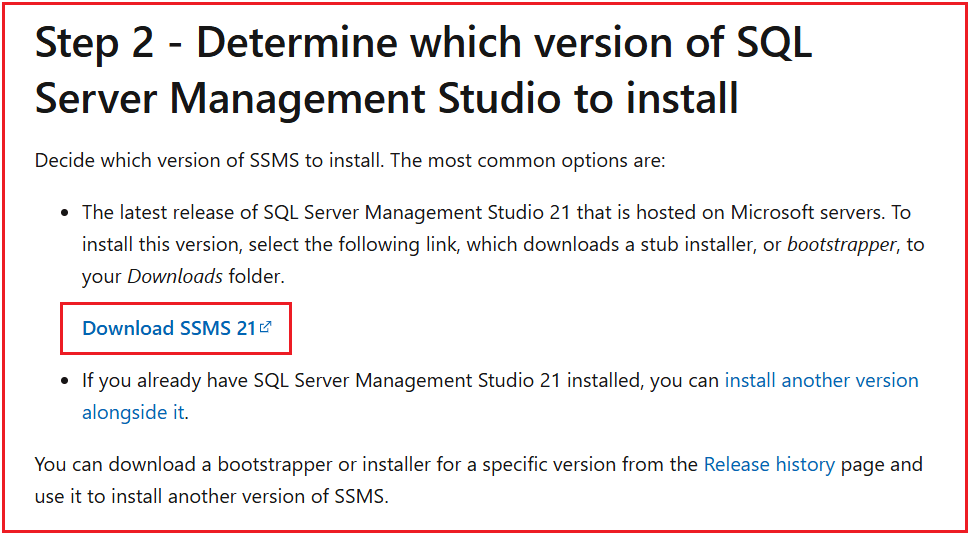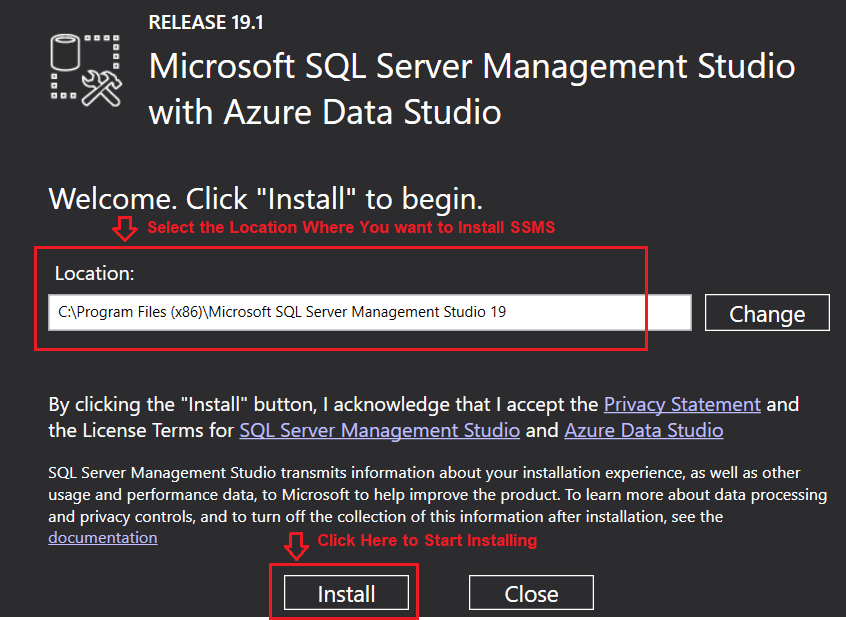Back to: ASP.NET Core Web API Tutorials
Download and Install SSMS
Once SQL Server is installed, you need a front-end tool to interact with the database. The database engine works in the background, but you need a client application to create databases, write queries, manage tables, and configure security. For this purpose, we use SQL Server Management Studio (SSMS), Microsoft’s official management tool.
What is SQL Server Management Studio (SSMS)?
SQL Server Management Studio (SSMS) is an integrated environment from Microsoft designed for managing SQL Server databases. It provides a user-friendly interface for performing both simple and advanced operations, eliminating the need to rely solely on command-line tools.
- Provides an interface to manage SQL Server instances (local or cloud).
- Allows you to query, design, and manage databases using SQL.
- Helps in configuring, monitoring, and administering SQL Server.
- Supports deploying, monitoring, and upgrading database components.
- Works with both on-premises SQL Server and Azure SQL Database.
In short, SSMS is the primary tool for developers, administrators, and database professionals to manage SQL Server effectively.
How to Download SQL Server Management Studio (SSMS)?
You can download SQL Server Management Studio from the link: https://learn.microsoft.com/en-us/ssms/install/install
Once you click on the link, it will open the following Download SSMS page. Click on the Download SSMS button as shown in the image below.

Additional Tool Installed with SSMS
Starting from SSMS version 18.7, Microsoft also bundles Azure Data Studio with the installer.
- Azure Data Studio is a lightweight, cross-platform, open-source tool.
- It works on Windows, macOS, and Linux.
- Useful for working with cloud databases, modern development, and scripting.
- Complements SSMS by providing a more flexible environment for developers.
When you install SSMS, both SSMS and Azure Data Studio will be available on your machine.
How to Install SSMS (SQL Server Management Studio)?
Once the download is completed, click on the EXE file, which will open the following installation window. Here, if you want to change the directory, you can do so, and then you need to click the Install button, as shown in the image below.

Once you click the Install button, it will ask, “Do you want to allow this app to make changes to your device?” Click yes. Once you click ‘Yes’, it will start downloading SQL Server Management Studio, and you can also check the download progress, as shown in the image below.

It will take some time to install SSMS. Once the installation is completed, you will get the following message.

Launching SQL Server Management Studio
Now that SSMS is installed, you can open it to connect with SQL Server.
- In the Windows search bar, type SSMS.
- Select Microsoft SQL Server Management Studio from the list.
The Connect to Server window will appear, prompting you to provide connection details.

Connecting to SQL Server with SSMS
Now, you need to identify to which SQL Server Instance you need to connect. So, if you’re connecting to your default instance, you will probably use either localhost or just a dot. Otherwise, you could click on Browse for more connections and then find a connection, or you might be given a server name. Let’s click on ‘Browse for more connections,’ as shown in the image below.

Browse for Servers
Once you click “Browse for more connections,” it will open the “Browse for Servers” pop-up. Here, you need to select the Database Engine and then select the SQL Server Instance to which you want to connect. In my case, I want to connect to SQL Server 2022 Dev and then click the OK button, as shown in the image below.

Authentication Mode
Once you click the OK button, the Connect to Server window will reappear, and you will notice that the Server Name is populated. Next, select ‘Windows Authentication’ as the authentication mode and then click the Connect button, as shown in the image below.

Once you click on the Connect button, it will connect to the SQL Server Database, and you will get the following SQL Server Management window, where you can do all types of Operations.

Key Uses of SSMS
Once inside SSMS, you can perform almost every database operation. Some important tasks include:
- Creating and managing databases (schemas, tables, views).
- Writing and executing SQL queries.
- Managing security by adding logins, roles, and permissions.
- Monitoring performance with Activity Monitor.
- Configuring backups and restores.
- Deploying stored procedures, triggers, and functions.
SSMS is an essential tool not just for administrators, but also for developers building applications that rely on SQL Server.
